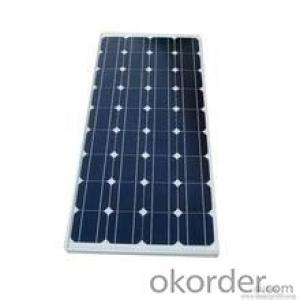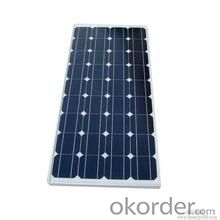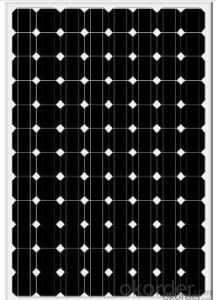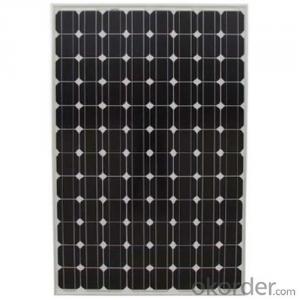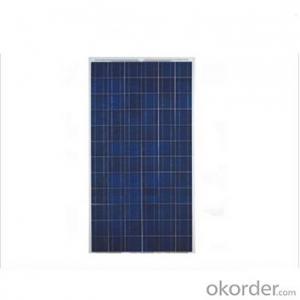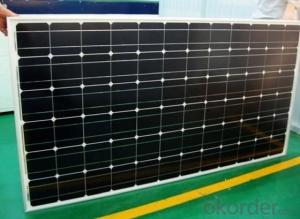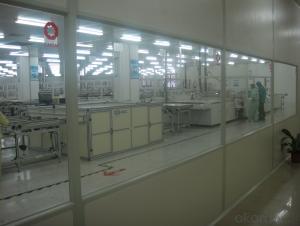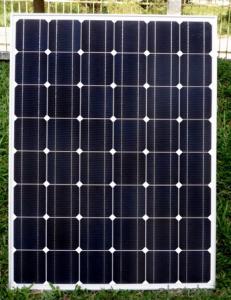Grade A Monocrystalline Solar Panel - Edp Solar Panels
- Loading Port:
- China Main Port
- Payment Terms:
- TT OR LC
- Min Order Qty:
- -
- Supply Capability:
- -
OKorder Service Pledge
Quality Product, Order Online Tracking, Timely Delivery
OKorder Financial Service
Credit Rating, Credit Services, Credit Purchasing
You Might Also Like
Quick Details
| Model Number: | |||||
| Material: | Size: | Number of Cells: | |||
| Max. Power: | Weight: | Maximum Series Fuse: | |||
| Maximum System Voltage: | Junction Box: | Cables/Connectors: | |||
| Encapsulant: | Back cover: | Front cover: | |||
| Surface maximum load capacity: | Frame: |
Packaging & Delivery
| Packaging Detail: | carton, customized package, standard package suitable for export. 21PCS/Pallet 504PCS/40'FT |
| Delivery Detail: | 7-20 days, depends on quantity |
Specifications
280w Monocrystalline Solar Panel
1.5-300w mono & poly solar panel
2.IEC,TUV,CE,ISO,ROHS
3.25years warranty
- Q: Can solar panels be installed on a barn or shed?
- Yes, solar panels can be installed on a barn or shed. In fact, barns and sheds are often great locations for installing solar panels as they typically offer ample roof space and are often in areas with good sun exposure. Installing solar panels on a barn or shed can help generate clean, renewable energy and potentially offset electricity costs for the building.
- Q: Can solar panels be used to power air conditioning units?
- Yes, solar panels can be used to power air conditioning units. Solar panels generate electricity from sunlight, which can be used to power various appliances, including air conditioning units. However, the size and efficiency of the solar panel system needed will depend on factors such as the size of the air conditioning unit and the energy requirements of the building.
- Q: Can solar panels be used to power a military base?
- Yes, solar panels can be used to power a military base. Solar power can provide a reliable and sustainable source of energy for various operations and facilities in a military base, reducing dependency on traditional energy sources and enhancing their efficiency and resilience.
- Q: Are solar panels suitable for all types of roofs?
- Solar panels are suitable for most types of roofs, including flat, sloped, and metal roofs. However, the suitability may vary depending on factors such as roof orientation, shading, and structural integrity. It is recommended to consult with a solar installation professional to determine the best options for a specific roof type.
- Q: I'm making a model of a solar photovoltaic tower for a school project. I need a way to store energy, and we thought about using capacitors (mainly because of our somewhat limited funding). The tower will have a small photovoltaic panel (around the size of a laptop keyboard with number pad) and some (around 50) quot;heliostats(just the mirrors, no moving parts). What kind of capacitors should i use? and would a capacitor bank be better? i am getting confused with all those uF, pF and can't see the difference.Thanx in advance
- There okorder /
- Q: Do I just run the wire from the panel into the charge controller and then to the battery AND can I simultaneously draw energy from the battery while it is being charged by the panel?Is it as simple as hooking it up like that?
- You have to keep the polarity straight. Red is positive + Black is negative - I don't know how much amperage you are drawing, or how many amps the solar panel puts out. This charge controller is a device I am unfamiliar with- What does it say on it? how many volts? how many amps?
- Q: I am thinking of buying a 3w solar panel called the nomad 3 from goal zero. I want to charge 35Wh lithum batteries. I have heard that lithium batteries are temperatmental and without a regulated current things could get ugly.I have a couple of chargers that came with the batteries. One is a 2v car charger and another is 0-240v wall charger.Goal zero sell something called a sherpa 50, which contains rechargeable batteries and an inverster and I think they suggest that I charge my batteries indirectly through the Sherpa 50, however, the sherpa 50 is expensive at $200, and seems to have a small capacity, in addition to being extra weight that i don`t want to carry.Electronics geniuses, you are my only hope.
- Lithium batteries do have special charging requirements. I would recommend that you use the 2 volt charger that came with them to keep them happy. Automotive power systems can have voltages as high as 4.5 volts when the engine is running so there's no need to limit the output of the panel to anything less than that. Check with the charger manufacturer to see what it will withstand. Some will work with systems up to 24 volts nominal (up to 29 volts actual) found in larger commercial vehicles such as trucks and busses. If your charger will work with both 2 and 24 volt systems you might not need anything extra to use the unregulated output of the panel. Otherwise I'd recommend a shunt regulator to clamp the output of the panel to no more than 4.5 volts. That way it would dissipate (waste) very little of the panel's power, and even that would only be during those rare times when the panel is producing maximum output. Such a device could be as simple as a high power zener diode, a low power zener coupled with a power transistor, or a precision shunt regulator such as a TL43 coupled with a power transistor. A more complex way would be a to use buck/boost regulator between the panel and your charger. You might gain a slight advantage under low light conditions when the panel isn't putting out much but the overall efficiency could end up worse than the simpler shunt regulator. Under optimum conditions, I would expect it to take a full day for a 3 watt (peak) panel to charge just one of your 35 Wh batteries. Charging an intermediate device such as the Sherpa 50 through its built in charger and then using it to charge your battery through yet another charger would severely cut your overall efficiency. Depending on how long you'll be gone, it might be far more practical, reliable, and economical to just carry (or find a way to be resupplied with) a few additional fully charged 35 Wh batteries. Don
- Q: Can solar panels be used for powering an electric fence?
- Yes, solar panels can be used to power an electric fence. Solar panels convert sunlight into electricity, which can be stored in batteries or used directly to power various devices, including electric fences. This off-grid solution is eco-friendly and cost-effective in areas without access to electricity.
- Q: I don't see much solar panels on people's houses where I live. I got a long time to go before doing so but I was planning on buying a few solar panels when I retire in the far future. In your opinion, is such an investment worth it? Would you buy them? I realize they are very expensive hence why I said when I retire. Thanks for your opinion
- You ask a great question, because this should really be a financial decision, and not only an environmental one. Depending on which state you live in, the payback on a system is often in the 5 to 2 year range. The great thing about solar panels is that the fuel source is free and you don't need to speculate on your future costs. You pay for the equipment up front, and then you just enjoy the free power. Most solar panel systems last at least 30 years, so compare the cost of solar panels to paying your average electric bill 360 times. And that does not include any inflation of energy cost increase. Check out our website to learn more.
- Q: I am currently building a house, iv designed it to be as self sustainable as possible, I'm in the process of installing solar panels but as I'm ordering online I was hoping someone here could tell me how many I would need to completely run a 5 bedroom home, just standard household appliances such as fridge and freezers, plasma tvs computers and of course lighting, various things like that, also I'll need power storage as well, some type of large rechargeable battery, any help would be great.
- You're missing a few assumptions: - where on the globe? - how well is your house insulated, how do you plan to heat/cool your house? - why do you insist on power wasting appliances like plasma screens? Usually, unless it's absolutely impossible, a grid-tie-in system is much better than an insular system. You could use the grid to 'store' electricity for those times when the sun isn't shining and as fall-back if your yield isn't quite as good as you calculated. With the battery system, you'll have to specify your reliability requirements. If you want a 00% guarantee that you'll always have electricity, even if the sun is not shining for a week longer than you've planned according to the past weather history of your area, you'll either have to ridiculously oversize your battery (and panel) system, or plan for some sort of backup system anyway. Finally, if you're really planing such a system, you might want to take a look at the fridges and freezers used on sailboats: these use a eutectic cold accumulator, i.e. you 'charge' the fridge when the engine is running (or the sun is shining) and it'll then keep the temperature for another ~2...35 (professional systems) hours.
Send your message to us
Grade A Monocrystalline Solar Panel - Edp Solar Panels
- Loading Port:
- China Main Port
- Payment Terms:
- TT OR LC
- Min Order Qty:
- -
- Supply Capability:
- -
OKorder Service Pledge
Quality Product, Order Online Tracking, Timely Delivery
OKorder Financial Service
Credit Rating, Credit Services, Credit Purchasing
Similar products
Hot products
Hot Searches
Related keywords
